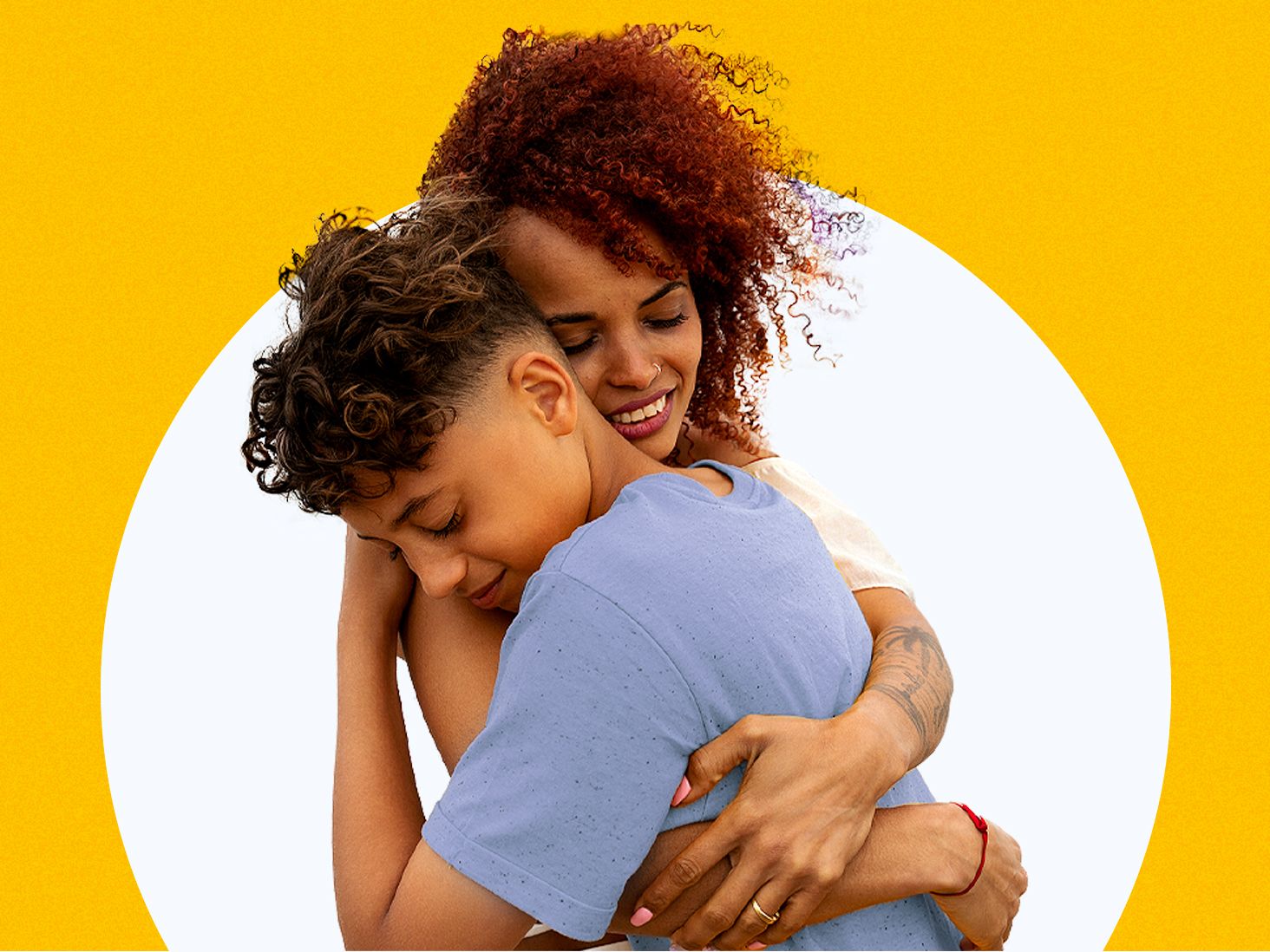
We include products we think are useful for our readers. If you buy through links on this page, we may earn a small commission. Here’s our process.
Psych Central only shows you brands and products that we stand behind.
Our team thoroughly researches and evaluates the recommendations we make on our site. To establish that the product manufacturers addressed safety and efficacy standards, we:- Evaluate ingredients and composition: Do they have the potential to cause harm?
- Fact-check all health claims: Do they align with the current body of scientific evidence?
- Assess the brand: Does it operate with integrity and adhere to industry best practices?
As a parent, it’s understandable to want to protect your kids from everything sad or scary. So it might feel strange to talk about something as serious as depression with your kids. It’s natural to have doubts like, “Are they ready for this?” or “Why would I bring this up when they haven’t told me they’re feeling depressed?”
But in today’s world, it’s more important than ever to make sure your kids are educated about topics like depression and suicide.
Depression affects nearly
Even though it can be challenging to broach these topics, there are ways to talk with children about depression that are supportive, empathetic, and age-appropriate.
Before you talk with your child about depression, it’s important to be knowledgeable about the subject matter you’re getting into. What, exactly, is depression?
Many types of depression exist. But the one that most people refer to when they talk about depression is clinically called major depressive disorder (MDD). MDD is a very common mental health condition.
The exact causes of depression are unknown, but factors like genetics, difficult life events, and brain chemistry may raise your chances of getting it.
To be diagnosed with MDD, you need to have had symptoms for 2 weeks or more. The Diagnostic and Statistical Manual of Mental Disorders, 5th edition (DSM-5), which many mental health professionals follow, defines various official diagnostic criteria. But other common symptoms also exist.
Some of the official and unofficial symptoms of depression include:
- consistently low or irritable mood
- loss of interest in activities that were previously enjoyable
- sleep disturbances (sleeping too little or too much)
- lack of energy
- changes in appetite
- weight changes
- feelings of worthlessness or guilt
- hopelessness
- concentration issues
- moving or speaking more slowly or more quickly than expected
- recurring thoughts about death or suicide
Other types of depression include:
- persistent depressive disorder (dysthymia)
- disruptive mood dysregulation disorder
- seasonal depression
- postpartum depression
Symptoms of depression can also appear in other mental health conditions like bipolar disorder.
How you talk with your child about depression depends a lot on how old they are.
Considering how common it is, older kids and teens have probably heard about depression before and may even know someone who’s been diagnosed with it. They may have done their own research into depression symptoms or wondered whether they, themselves, have it.
Still, they could have gotten the wrong information about depression, depending on who their source was.
For younger kids, the subject of depression may be new. It’s possible that they’ve never heard the term before, or they might have misunderstood what it really means. Or they might have been affected by depression without having a name for it — for example, you or another adult in their life may live with depression.
Talking with older kids and teens
If your child is older, consider starting the conversation by explaining that depression is a very common mental health condition that affects people’s brains.
It’s important to emphasize that depression is never a person’s fault. It can happen to anyone.
You can help break down stigma by explaining that depression is just like any other chronic health condition, like diabetes. Some people develop it and some people don’t. Sometimes depression is unavoidable, but there are things we can do to protect ourselves against it, as well as things to manage and treat it.
With older kids, you can talk about the specific symptoms of depression. This is when the information above might come in handy.
If you think your child may already have depression, then it could be a good idea to go through the list of symptoms with them and ask them which ones they identify with. If not, you can turn this into an engaging discussion by reading about public figures who have shared that they have depression.
If your child does have something to share about their own experience with depression, try to listen without judgment and avoid jumping to giving advice.
Instead, consider asking open-ended questions that invite them to elaborate on their experiences. This way, you let them know they’re not alone and that you support them no matter what.
It’s also a good idea to reassure your child that many people who receive treatment for depression — such as therapy or medication — experience long periods of being symptom-free.
You can explain that experts call this “remission.” While there isn’t a cure for depression, being in remission means that symptoms no longer affect someone’s quality of life.
Talking with younger children
Depending on their age and developmental level, young children may not be able to understand sophisticated medical concepts like brain science and symptoms.
When explaining depression to young children, you can relate it to their own emotional experiences by asking them to remember a time they felt sad or blue. Most children will be able to understand this feeling.
Consider explaining that for some people, this sad feeling never goes away. When this happens, it’s called depression.
You might want to consider using an analogy with younger kids. For example, you could explain, “When people get depression, it feels like there’s a dark rain cloud following them everywhere they go. They can see that it’s sunny outside and everyone else is playing in the sunshine. But right above their head, it’s raining.”
It’s a good idea to reassure your child that depression is nothing to feel guilty or embarrassed about. It’s also important to stress that treatment is possible.
If your child has had a good experience with their pediatrician, then you can use that relationship to explain how treatment can help. For example: “Do you remember when you got a boo-boo on your forehead and the nice doctor fixed it up and made you feel all better? There are special doctors that make the depression cloud go away, too.”
When you talk about depression with your child, it’s important to be open to any questions they have so they don’t walk away from the conversation feeling confused or scared.
Here are some common questions that might come up, and examples of how to answer them:
I feel sad sometimes. Do I have depression?
Sadness is a universal human experience. We’ve all felt sad at some point, including kids. When you explain that one of the symptoms of depression is persistent sadness, your child might start worrying that they have depression (whether they really do or not).
It’s important not to brush this question off, for example, by answering, “Of course not, silly!” Instead, try to strike a balance between reassurance and empathy.
You can explain to your child that everyone feels sad sometimes, and that’s to be expected. You may want to bring up examples like “When our dog died when I was a little girl, I was so sad that I cried for days.”
Following that, it’s a good idea to explain that depression and sadness aren’t the same thing. People with depression feel sad, low, or irritable almost all day, every day. They’ve also felt this way for longer than 2 weeks and could have other feelings like tiredness or losing their appetite.
Consider asking your child if they relate to any of this. If they tell you they think they’re experiencing depression, it’s important to listen and reach out for professional help if needed.
Am I ever going to feel better?
If your child is facing depression now, it’s easy for them to start feeling hopeless, like there’s no light at the end of the tunnel. If they ask you this question, you can reassure them that there are lots of treatments that can help them feel better.
This would be a good moment to introduce the topic of going to therapy. You can explain what a mental health therapist does — they’re understanding, trustworthy grown-ups who talk with and play with kids.
Lots of kids see therapists and start experiencing less depression. Therapists can teach you tricks and tools you can use to make yourself feel better, even when you’re feeling really down.
Try to empower your child and communicate your belief in them. For example, you could say something like, “I know it’s so hard right now, but I know that you’re going to get through this. And I’m going to be with you every step of the way.”
Talking with your kid about therapy
If you’re unsure how to talk with your child about therapy, Psych Central’s “A BIG Help for BIG Feelings” is a guide about what therapy may look like, intended to be read to or by children.
Why is this happening to me?
Your child might want to know the reasons why they’re experiencing depression when they’re friends are not.
It’s a good idea to be honest with them and explain that you don’t know the answer to that. Consider telling them that scientists are still trying to figure out why some people get depression and not others.
If there’s one thing to stress during this conversation, it’s that having depression is not their fault. Try to remind them that they didn’t do anything to cause depression — but there are things they can try to get better.
It can be intimidating to start these topics, especially when you’re not a mental health expert. But you don’t have to have these conversations without guidance.
There are many great resources for kids of all ages, and these can support you in navigating this conversation and helping your child understand what depression really is.
Still, it’s important to keep in mind that while there’s a lot of information on the internet, not all of it is accurate. It’s a good idea to focus on respected organizations that have released their own resources about depression for children and teens. Some of these include:
Other resources — including apps, books, and online resources — can be shared directly with your child to help them understand and cope with depression.
You may want to consider:
- Teen Mental Health Speaks… Depression Magazine by mentalhealthliteracy.org
- Today I Feel…, a worksheet for identifying feelings for young kids by Children’s Mental Health Matters! campaign
- My3, a safety-planning app for teens with depression or suicidal ideation by the Mental Health Association of New York City
- “Balloons for Papa,” a children’s book about living with a parent with depression
- “Depression: A Teen’s Guide to Survive and Thrive,” a workbook for teens with depression
- “Blueloon,” an illustrated children’s book about a balloon who has depression
Lastly, consider sharing these hotline numbers with your child, especially if they’re a teen. They can get connected immediately to a trained listener who can help them. It can even save their life if they’re thinking about suicide.
- National Suicide Prevention Lifeline: 800-273-8255
- Crisis Text Line: Text HOME to 741741
- The Trevor Project (for LGBTQ+ Youth): Call 866-488-7386 or text START to 678678
Recognizing signs of suicidal ideation in children and teens
If you’re concerned that your child may be experiencing depression or suicidal thoughts but you’re not sure how to spot the signs, Psych Central’s in-depth article on recognizing signs of suicidal ideation in children and teens may help.
In an emergency
If you believe your child is in immediate danger:
- Remove objects from their reach that could be used to harm themselves, such as pills, weapons, or sharp objects.
- Stay with them and seek professional help right away.
- Call your child’s pediatrician, therapist, or psychiatrist, or contact your local emergency room (or 911, if you feel it’s safe for you). Tell the operator that it’s for a child in crisis so they can direct you to the right support.
It’s never too early to start talking with your child about depression, especially if they’re already affected by it.
If you, your child, or someone else in your child’s life lives with depression, then it could be especially important to bring these conversations up so that your child understands what’s going on. Your child needs to know that depression is never their fault and that it can be treated.
It’s good to keep in mind that this initial conversation about depression should be just that — the initial one. In other words, it may be necessary to keep having these conversations, especially if depression directly affects your family.
With time, talking about depression will become normalized, and your child may feel comfortable opening up to you if they ever start feeling depressed themselves.
The following section is intended to be read to or with your kid to help them better understand depression. Feel free to personalize it with your own experiences.
Kids’ corner: What is depression?
Can you remember a time when you felt really sad? Maybe you remember when grandma had to leave to go back home, or when your pet hamster passed away. You told me you were really sad and you cried a lot.
Everyone gets sad sometimes, especially when sad things happen. I feel sad sometimes, too.
Usually, those sad feelings go away. You might still remember the sad thing that happened, but you aren’t crying all the time anymore. Like after grandma left, you started playing with your friends again and having fun. Do you remember?
But for some people, their brains get sick. And those sad feelings get stuck in their brain for a long time. This is called “depression.”
Depression is like a sticky rain cloud that follows them around everywhere they go. They might feel really tired but not be able to sleep. They might not want to eat anything. They might feel totally blah about everything, even things they used to love doing.
Some people feel like this because they lost someone they love. Or they were getting bullied at school. But some people can’t figure out why they feel this way. They just do. It isn’t their fault, and it’s nothing to feel guilty about. Getting depression is really common — millions and millions of people have it!
Depression feels bad, but you don’t need to be afraid of getting it. Talking about your feelings helps a lot. So does thinking about the things you love, like playing basketball with your friends or going to the park with your puppy. And if that doesn’t work, there are special doctors who can help you learn to handle or get rid of the sticky depression cloud.
If you ever feel this way, remember that you’re not alone and that I’m always here for you, no matter what.


